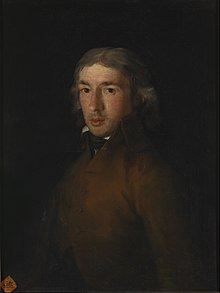Leandro Fernández de Moratín

Leandro Fernández de Moratín (born March 10, 1760 in Madrid , † June 2, 1828 in Paris ) was a Spanish poet and playwright .
Life
Leandro Fernández de Moratín was born the son of the Spanish poet and playwright Nicolás Fernández de Moratín , which is why he is often referred to as "Moratín the Younger". His mother's name was Isidora Cabo Conde. When he was four years old, he contracted smallpox . Since his father was against university studies, he first became a watchmaker.
He was the protégé of Manuel de Godoy and after the occupation of Spain by Napoleon Bonaparte's troops, he took as a so-called “ Afrancesado ” party for his brother Joseph Bonaparte , who ascended the Spanish throne after the Bourbons had abdicated . In gratitude, he was appointed "Bibliotecario Mayor" (chief librarian), which caused him some trouble after the French were driven out , so that he moved to Barcelona and spent the last years of his life in Bordeaux and Paris, where he also died.
plant
Leandro Fernández de Moratín was the most important playwright of the 18th century in Spain and campaigned for the renewal of the theater in Spain. He wrote in the style of neoclassicism .
Moratín translated works by Molière such as Le médecin malgré lui ( The doctor against his will ) or L'école des maris (The school of husbands) and also made the first prose translation of Shakespeare's Hamlet into Spanish.
Less known is his role as a theater historian: his posthumously published history of the origins of the Spanish theater Orígenes del teatro español (1830–31) was one of the first serious studies of Spanish theater before Lope de Vega .
Dramas
Moratín sees the theater as a moral institution for spreading bourgeois values; The focus of his dramas is the middle class with its problems such as finding a partner and family as well as education, especially those of women. Nothing extraordinary or fantastic occurs, which distinguishes him from the foothills of late baroque theater with its tendency to improbable actions. Moderation and balance in the moral as well as probability are its basic principles. The author turns against extremes such as B. old men who are married to a very young girl against unreasonable passion, avarice, envy, frivolity etc. It should, as he says, vices and errors of society be pilloried. Similar to Molière, his figures are embodiments of generalizable types.
- El viejo y la niña (The old man and the girl): Comedy, premiered on May 22, 1790, the basic theme is the age discrepancy between married couples and the woman's free choice of a life partner
- La comedia nueva (The New Comedy): Theatrical satire in prose, premiered on February 7th, 1792 at the Teatro Príncipe, the subject is a supposedly “new comedy” by Eleuterio Crispín de Andorra, El gran cerco de Viena (The Great Siege of Vienna), whose First performance leads to fiasco . The setting is a coffee house , a new phenomenon in 18th century Spain; The model was Goldoni's comedy La bottega del caffè . At the same time, the work represents a perfect realization of the classical norms such as the Aristotelian units : the entire action takes place in a single room of the café and the performance lasts exactly as long as the "played time".
- El sí de las niñas (The girls' vows): Comedy, 1805. Here, too, it is about the age difference in the relationship between men and women and the free choice of the “young girls” when choosing a partner; a great success in its day.
- El barón (The Baron): conceived as Zarzuela in 1787 , later rewritten and premiered as a comedy at the Teatro de la Cruz in 1803.
- La mojigata : Written in 1791, first performed on May 19, 1804 at the Teatro de la Cruz
- La derrota de los pedantes (The defeat of the pedants)
Poems
- In: Obras dramáticas y líricas 1825, Vol. III: 109 poems
Work editions
- El sí de las niñas. La comedia nueva . Edited by René Andioc. Madrid: Espasa, 2001.
- Poesías completas (poesías sueltas y otros poemas) , edited by Jesús Pérez Magallón. Barcelona: Sirmio, 1995.
literature
- Alborg, Juan Luis: Historia de la literatura española . Madrid: Gredos, 1972, Vol. III.
- Andioc, René: Teatro y sociedad en el Madrid del siglo XVIII . Madrid: Fundación Juan March-Castalia, 1976
- Doménech, Fernando: Leandro Fernández de Moratín . Madrid: Síntesis, 2003.
- Franzbach, Martin: History of Spanish Literature at a Glance . Stuttgart: Reclam, 2002 (= Universal Library; No. 8861) ISBN 3-15-008861-5
- Gumbrecht, Hans U .: A history of Spanish literature , 1484 pages, Frankfurt am Main: Suhrkamp 1998, ISBN 3518580620
- Neuschäfer, Hans-Jörg: Spanische Literaturgeschichte , 446 pages, Stuttgart: Metzler, 2nd edition 2006, ISBN 3476018571
- Rossi, Giuseppe Carlo: Leandro Fernández de Moratín. Introducción a su vida y obra . Madrid: Cátedra, 1974.
- Strosetzki, Christoph: History of Spanish Literature , 404 pages, Tübingen: Niemeyer, 2., unchanged. Edition 1996, ISBN 3484503076
See also
Web links
- Literature by and about Leandro Fernández de Moratín in the catalog of the German National Library
- Works by and about Leandro Fernández de Moratín in the German Digital Library
- Works by and about Leandro Fernández de Moratín at Open Library
- Biblioteca Virtual Miguel de Cervantes Edition of works in Spanish
| personal data | |
|---|---|
| SURNAME | Fernández de Moratín, Leandro |
| BRIEF DESCRIPTION | Spanish playwright |
| DATE OF BIRTH | March 10, 1760 |
| PLACE OF BIRTH | Madrid |
| DATE OF DEATH | June 2, 1828 |
| Place of death | Paris |
